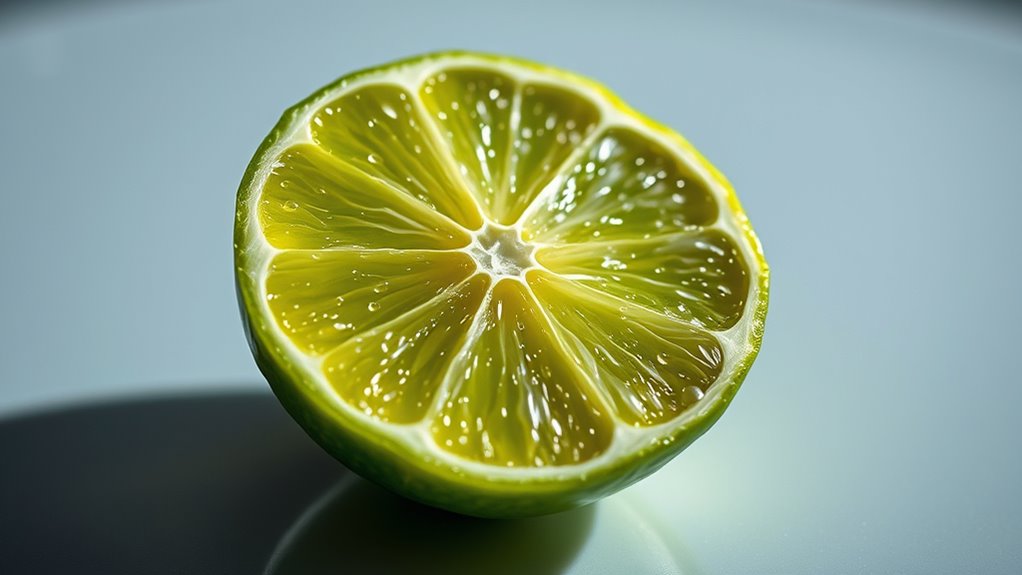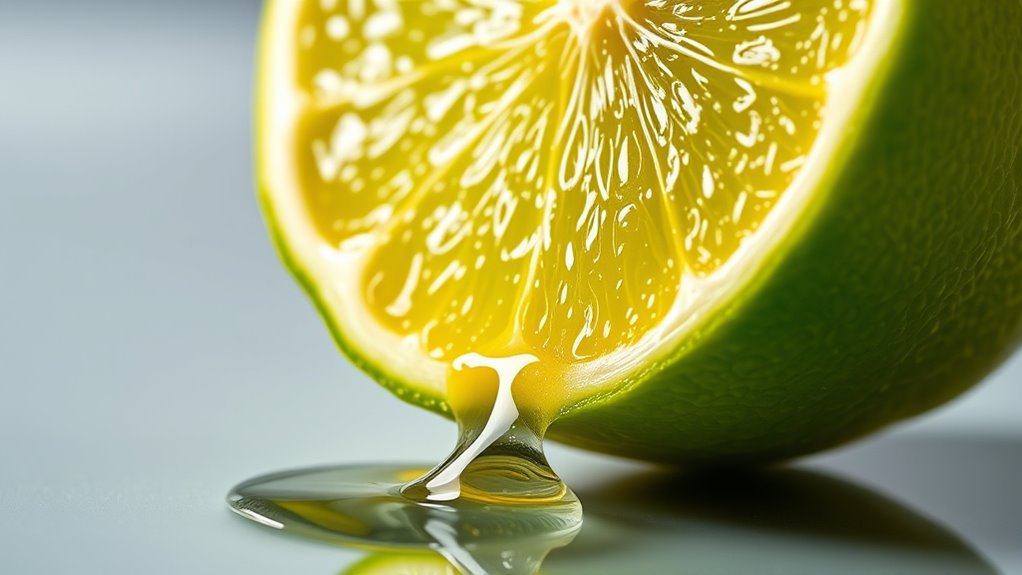To guarantee the best lime juice and zest oils, select ripe, fresh limes that feel heavy for their size. Handle and extract the juice carefully to preserve its vibrant flavor and aroma, focusing on minimal processing. The zest oils provide essential aromatic compounds, so avoid over-washing or zesting the bitter pith. Proper storage and choosing fresh-squeezed options keep the flavors lively. Continue exploring these tips to release the full potential of lime juice and zest oils.
Key Takeaways
- Lime zest oils contain aromatic compounds that enhance flavor and aroma when incorporated into lime juice.
- Proper extraction of lime zest preserves essential oils, boosting the citrus aroma in the juice.
- Fresh, ripe limes produce higher-quality juice with more vibrant flavor and aromatic oil content.
- Juicing techniques and handling impact the retention of flavor and aromatic oils in lime juice.
- Minimally processed or fresh-squeezed lime juice maintains superior flavor and aromatic profile compared to commercial options.

Have you ever wondered why lime juice is a staple in kitchens and cocktails worldwide? The answer lies in the rich history of lime cultivation and the diverse lime flavor profiles that make it so adaptable. Lime cultivation has been a vital part of agriculture in tropical and subtropical regions for centuries. Farmers carefully tend to lime trees, selecting the best varieties to guarantee optimal fruit quality and flavor. The climate, soil, and cultivation practices all influence the size, juiciness, and aroma of the limes you find in markets. When you squeeze fresh lime juice, you’re tapping into a fruit that has been cultivated with precision to deliver consistent flavor and aroma, making it a favorite in culinary and beverage applications.
Lime flavor profiles are incredibly nuanced, which is part of what makes lime juice so versatile. Depending on the variety—such as Persian limes, Key limes, or other regional types—the flavor can range from mildly sweet and floral to intensely tart and zesty. This diversity allows you to select the right lime for your recipe or drink, whether you want a subtle citrus note or a bold punch of acidity. The freshness of the lime juice, combined with these distinct flavor profiles, can elevate simple dishes or complex cocktails alike. When you choose quality lime juice, you’re also getting the benefit of the essential oils from the lime peel, which carry aromatic compounds that enhance flavor and aroma.
The process of extracting lime juice influences its overall quality. The best lime juice is obtained from ripe, freshly picked limes, which retain their vibrant flavor and high juice content. Proper handling during juicing preserves these qualities, avoiding oxidation or loss of essential oils. Commercially, lime juice is often pasteurized or preserved, which can slightly alter flavor profiles, but high-quality brands aim to keep the essence of fresh lime. The flavor profiles are further affected by storage and packaging, so looking for fresh-squeezed or minimally processed options can make a noticeable difference in your dishes or drinks.
Frequently Asked Questions
How Can I Tell if Lime Juice Is Fresh?
To tell if lime juice is fresh, smell its aroma—fresh lime juice has a bright, citrusy scent. Check the clarity; fresh juice should be clear and vibrant, not cloudy or dull. When you taste it, it should be tangy and lively, not flat or sour. If the aroma is dull or the juice looks dull or cloudy, it’s likely not fresh. Always trust your senses for the best quality.
What Are the Best Storage Methods for Lime Juice?
You should store lime juice in an airtight container, preferably glass or BPA-free plastic, to prevent contamination. Keep it refrigerated using proper refrigeration techniques, ideally at or below 40°F (4°C), to preserve freshness. For longer storage, consider bottled preservation methods like adding a natural preservative or pasteurizing. Always label with the date you opened it, and use within a week or two for the best flavor and quality.
Does Lime Juice Lose Potency Over Time?
Like a fading sunset, lime juice gradually loses its brilliance. It does lose potency over time, with flavor degradation sneaking in if you don’t employ proper preservation techniques. To keep its vibrant punch, store it in airtight containers in the fridge, and use it within a few weeks. Otherwise, the lively citrus essence diminishes, leaving behind a duller, less flavorful condiment that’s less effective in your culinary creations.
Are Organic Limes Better for Juice Quality?
Yes, organic limes often provide better juice flavor because they’re grown without synthetic pesticides or fertilizers, which can affect taste. Organic certification guarantees the fruit is cultivated naturally, leading to fresher, more vibrant juice. You’ll likely notice a richer, more authentic lime flavor in your juice, and the absence of chemical residues can also enhance its overall quality. So, choosing organic limes can elevate your juice experience.
Can Lime Zest Oils Be Used Separately From Juice?
Yes, you can use lime zest oils separately from juice. Through zest extraction, you can extract essential oils, which contain the concentrated aroma and flavor compounds. This process involves careful essential oil separation, ensuring you get pure zest oils without juice. You might add these oils to enhance dishes or cocktails, providing a vibrant citrus aroma without diluting your recipe with liquid lime juice.
Conclusion
Now that you know how to select and preserve lime juice, you’re all set to elevate your dishes and drinks. Remember, the secret is in the details—like zest oils and juice quality—that make a real difference. Don’t just scratch the surface; dig deeper and enjoy the full flavor experience. After all, variety is the spice of life, and with fresh lime juice, you’ll always have something to brighten your culinary adventures.
Cindy thoroughly researches juicing trends, techniques, and recipes to provide readers with practical advice and inspiration. Her writing style is accessible, engaging, and designed to make complex concepts easy to understand. Cindy’s dedication to promoting the advantages of juicing shines through her work, empowering readers to make positive changes in their lives through the simple act of juicing.











